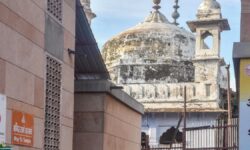NEW DELHI:
Delhi’s reckless consumerism produces tonnes of garbage every day that has now piled up in three landfills that are an eyesore in the city: Bhalswa, Ghazipur and Okhla.
There are colonies of scavengers living near these sites that have been completely overlooked by the capital city that boasts of a spick and span Lutyens zone. They go to these toxic landfills each day, looking for plastic wares, milk packets, jute boris, glass bottles, copper wires, electronic wastes: anything that can help them earn bare minimum income in order to survive.
A heritage walk, conducted as part of the second edition of India Heritage Walk Festival (IHWF), will take the participants to the dumpsite in Okhla in south Delhi to see the impact of the garbage that is generated and where it ends.
Delhi is among 37 cities hosting the month-long, multi-city IHWF 2019, organised jointly by Sahapedia (sahapedia.org), the online resource on Indian arts and culture, and UNESCO, to encourage citizens to explore the tangible and intangible heritage of their cities and towns. All bookings for the festival are powered by Odigos, a product by the Bird Group, is an online marketplace that connects tourists to certified guides in India. Odigos app provides a seamless way for travellers and locals alike to understand and explore the iconic sites of our country.
Latest reports reveal that the areas under the North Corporation alone produce almost 4,000 MT of garbage every day. Contrary to common belief, only 10 per cent of the segregated plastic actually gets recycled.
This walk to the Okhla landfill on February 10 will bust the myth about plastic recycling and reveal the toxicity that every piece of plastic in our daily lives creates. The bloating mountains of garbage are proof of the fact that irrespective of the colour of the dustbin that plastic is disposed in, it finds its way back to harm the environment and is not a solution for sustainable living. .
Mohit Gupta, an engineer, explorer and travel enthusiast who organises green travel workshops, will lead the walk during which the participants will first have a meal at the market and collect the garbage they are generating. Then they will head to the dumpsite to see the impact of the produced garbage.
Another heritage walk in the city on February 9 will take the attendees to Purani Dilli or Old Delhi, the flag bearer of Delhi’s rich history. Experiencing the city through the camera lens, the participants would delve into the historic evolution of the city through street photography.
Dinesh Khanna, a popular name in street photography and co-founder of the Delhi Photo Festival who started his career by selling calculators in Chawri Bazaar, checking quality of garments in a Faridabad factory, and working as a busboy in a bar in New York, will lead this walk.
During the walk, Khanna will use the art of street photography as a portal to get a glimpse into the cultural heritage and contemporary scenario of Old Delhi. The bustling area is an enduring signpost of the continuation of old ways with striking examples of old relics and architecture. Street photographers try to capture myriad emotions and the interaction between space, time and people in that one decisive moment. Khanna is keen to have the participants examine and discuss impressions, expressions and the relationship between people, lived habitat and the image through interactive sessions during the walk.
The IHWF, which received the prestigious PATA Gold Award 2018 for its maiden edition organised last year, is a one-of-its-kind month-long festival covering 37 cities, with nearly 100 heritage walks and outreach events. The February 02-28 festival is being supported by NMDC, a state-run mineral producer and explorer. The events’ bookings are facilitated by Odigos, an app that makes travel and discovery easier in India.
Vaibhav Chauhan, Festival Director (IHWF) and Secretary, Sahapedia, said: “We want to democratise access to local history and culture. One might be living in the same neighbourhood for years, but there is a big chance that an important landmark, tucked away in a back alley, has been missed and forgotten. The IHWF is that opportunity to discover the hidden gems linked to the history of a place, town or city.”
Junhi Han, Head and Programme Specialist for Culture, UNESCO New Delhi office, said, “The IHWF programme addresses knowledge of local architectural heritage, sustainable tourism, with a special focus on gender-related issues and accessibility in cultural heritage facilitating more inclusive and better outreach. The festival is expected to involve, engage and sensitize people, in particular the youth, about their cultural heritage.”
Details about the walks, registration and other programmes of IHWF 2019 are available on: https://www.odigosguides.com/India-heritage-walk-festival




